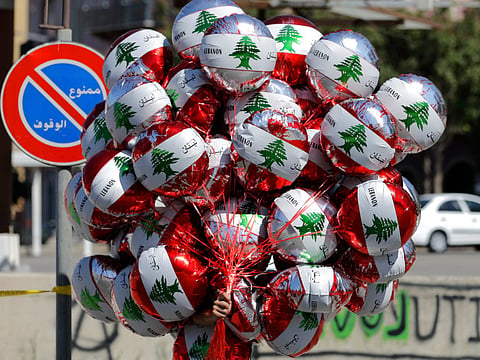Thousands protest against government corruption in Lebanon
“You Stink” campaign mobilised independently of sectarian parties that dominate Lebanese politics

Beirut: Thousands of people are gathering amid tight security in downtown Beirut, ahead of a major rally to protest government corruption and the country’s dysfunctional political system.
At least two or three armored personnel carriers were deployed around the prime minister’s office Saturday. A man over a megaphone chanted: “Declare it a revolution!”
Saturday’s protest is expected to be the largest of demonstrations that began last week over garbage piling up in the streets of Beirut, following the closure of a main landfill. But the government’s failure to resolve the crisis has evolved into wider protests against a political class that has dominated Lebanon since the end of the country’s civil war in 1990.
Similar protests drew thousands onto the streets before turning violent last weekend. Prime Minister Tammam Salam has threatened to resign, a move that could tip the state into deeper political turmoil.
Protesters began gathering early, playing music and singing close to government headquarters. Security forces have installed additional barricades and barbed wire.
The “You Stink” campaign was mobilised independently of the big sectarian parties that dominate Lebanese politics after the government failed to solve a crisis in trash disposal, leaving piles of refuse rotting in the summer sun.
For the protesters, the mounds of garbage reflect the failings of a state they say is rotten with corruption.
Amnesty International said on Saturday Lebanon should investigate allegations that security personnel used excessive force to disperse protesters in Beirut last week, calling for restraint ahead of the new rally.
Protest organisers blamed last weekend’s violence on “infiltrators” linked to political movements. Security forces last week fired water cannon and tear gas at demonstrators, some of whom threw stones and sticks at riot police.
Amnesty, quoting figures from the Red Cross, said at least 343 people were treated for injuries and 59 more were hospitalized.
Lama Fakih, senior crisis adviser at Amnesty International called for police and soldiers suspected of “arbitrary or abusive force” to be brought to justice”, and called on security forces to refrain from using unnecessary force.
Campaigners are calling for the environment minister to resign, for snap parliamentary elections and a resolution to the garbage crisis. They also want better public services in a country with daily electricity cuts and summer water shortages.
“We are asking since last week for the defeated and poor Lebanese people, and those who need work and medical services, to join us today in this protest,” activist Khaldoun Jaber said, after camping out overnight in a square near the government headquarters. “Maybe we can achieve the Lebanon we dream of.” The garbage crisis has exposed wider political deadlock in Lebanon, where sectarian and power rivalries have been intensified by the Syrian conflict next door, more than two decades after Lebanon’s own civil war.
Salam’s government, which groups together rival parties, has been mostly hamstrung since it came to office last year, paralysed by power struggles and disputes among politicians.
Salah Nour Al Deen, a Lebanese national who travelled from Britain to take part in the protest on Saturday, said it was time to remove “the corrupted system we inherited after the civil war”.
“I ask all expatriates and all Lebanese from all religions to join in the protest,” he said. “If you don’t come, we won’t succeed. If we stay at home, they will rule for another 25 years or more.”



